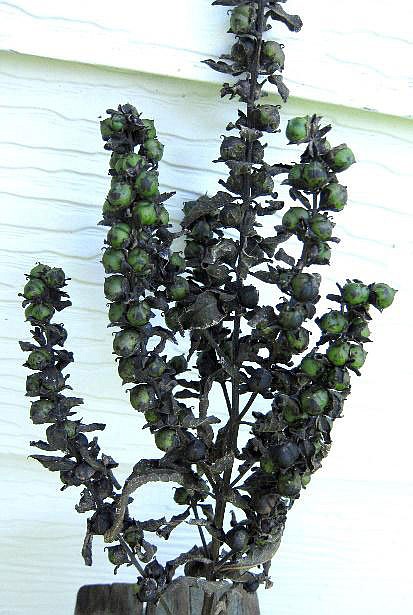Q. What is this plant (see photo)? I am worried it is invasive because I've never seen it before.
A. It is Mullein Foxglove (Dasistoma macrophylla). Don't worry about it, as it is a woodland indicator plant.
Q. I have a lilac bush, and its leaves are getting a sooty gray on the surface. What is this, and should I do something about it?
A. It is most likely powdery mildew, which lilac is notorious for getting. It is caused by several closely related fungi that survive in plant debris or on infected plants, and while afflicting a number of different plants it is fairly host-specific (what infects phlox isn't the same to affect lilac). But if you see powdery mildew on one plant, then weather conditions, usually high humidity, are favorable for development of the disease on a wide range of plants. This disease always worsens in late summer to fall.
For many trees and shrubs (i.e., lilac), powdery mildew is a cosmetic, non-lethal disease. For other plants (i.e., rose and ninebark) powdery mildew can cause severe leaf loss and even branch tip dieback. When a highly valued plant has had severe leaf loss due to powdery mildew for several years, you may want to consider using a fungicide for control. There are a number of fungicides labeled for this disease on ornamentals. Sprectracide Immunox (active ingredient myclobutanil) is most easily found at area retailers. Alternatively, a combination of baking soda (1 tablespoons) and lightweight horticultural (i.e., Sunpray) oil (3 tablespoons) in water (1 gallon) has also been shown to be effective for powdery mildew control. Most products should be applied every seven to 14 days while the disease is active. Be sure to read and follow all label instructions for any pesticide used.
If planting a lilac, there are cultivars which have tolerance to this disease. It is worthwhile to seek those out and plant them.
Q. I am establishing a new flower bed alongside my house. I notice pillbugs and sowbugs (roly polies) in the mulch, as well as ants. Should I try to kill them?
A. Pillbugs and sowbugs are attracted to decomposing organic matter, thus are fairly common where mulch is used. They are not considered a pest if they stay outside. The same is true for ants. If they actively enter your house, then this is another matter, and you should consider ways to reduce this. Use of insecticides to eliminate them would be reserved for when they are occurring inside the house. If there has been a problem with them in the past, then non-organic matter mulches could be considered, like rocks or plastic based mulch, or the flower bed established elsewhere.
Q. I have had some streambank erosion with these big rains of the last month or so. Who can I contact for assistance?
A. If you are with the city limits of Jefferson City, contact the Public Works Department and ask to talk with someone who works with stormwater. In some instances, they may be willing to visit your property to review your situation. Stormwater flooding is a significant issue in a hilly such as Jefferson City.
If you are outside of city limits, try contacting the Missouri Department of Conservation; their California, Missouri, office (573-796-0286) provides service to Jefferson City and has personnel who have knowledge in this area. They also, depending on the situation, may be willing to visit your property.
The Central Missouri Master Gardeners are a volunteer group of 191 members, 122 of whom are Cole County residents, who maintain 11 beautification sites in Cole County, which are nonprofits or public entities. Master Gardeners must complete a basic training program of at least 30 hours of horticultural training, as well as 30 hours of volunteer service. The Missouri Master Gardener program is supported by the University of Missouri Extension.
Have a gardening question of your own? The Master Gardener Hotline is open from 12:30-4:30 p.m. Tuesday and Friday afternoons. Call 634-2824 or stop by the Cole County Extension Center at 2436 Tanner Bridge Road.

